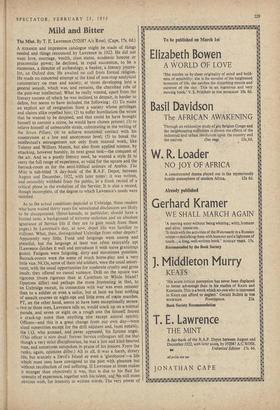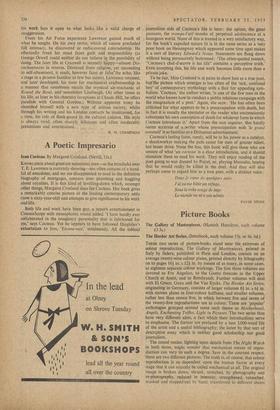Mild and Bitter
The Mint. By T. E. Lawrence (352087 A/c Ross). (Cape, 17s. 6d.) A STRANGE and impressive catalogue might be made of things needed and things renounced by Lawrence in 1922. He did not want love, marriage, wealth, class status, academic honour or proconsular power; he declined, in rapid succession, to be a statesman, a director of archaeology, a banker, a literary journa- list, an Oxford don. He awaited no call from formal religion. He made no concerted attempt at the kind of non-stop analytical commentary on man and society, at times developing into a general assault, which was, and remains, the cherished role of the post-war intellectual. What he really wanted, apart from the literary success of which he was inclined to despair, is harder to define, but seems to have included the following : (1) To make an explicit act of resignation from a society whose privileges and claims alike repelled him; (2) to suffer humiliation (he wrote that he wanted to be despised, and that could he have brought himself to commit a crime, he would have chosen prison); (3) to relieve himself of unbearable strain, culminating in the writing of the Seven Pillars; (4) to achieve emotional contact with his countrymen at a low and anonymous level; (5) to break the intellectual's estrangement not only from manual work, like Tolstoy and William Morris, but also from applied science, by attacking, however humbly, its next great task—the conquest of the air. And as a purely literary need, he wanted a style fit to carry the full range of experience, as valid for the square and the barrack-room as for the semi-biblical ardours of Arabia. The Mint is sub-titled 'A day-book of the R.A.F. Depot, between August and December, 1922, with later notes'; it was written, and ostensibly withheld from the public, as a frank record of a critical phase in the evolution of the Service. It is also a record, though incomplete, of the degree to which Lawrence's needs were satisfied.
As to the actual conditions depicted at Uxbridge, those readers who have waited thirty years for sensational disclosures are likely to be disappointed. (Smut-hounds, in particular, should have a limited taste, a background of extreme seclusion and an absolute ignorance of Service life if they are to gain much from these pages.) In Lawrence's day, as now, depot life was familiar to millions. What, then, distinguished Uxbridge from other depots? Apparently very little. Food and language were coarse and plentiful, but the language at least was often enjoyably apt (Lawrence catches it well and introduces it with naive gratuitous gusto). Fatigues were fatiguing, dirty and sometimes pointless. Barrack-rooms were the scene of much horse-play and a very little vice. NCOs, some of them old soldiers, were the usual assort- ment, with the usual opportunities for moderate cruelty and gross insult; they offered no casual violence. Drill on the square was rigorous (more rigorous than at Caterham or Whale Island? Opinions differ) and perhaps the more frustrating in that, to an Uxbridge recruit, its connection with war was even remoter than to a soldier or even a sailor, but at least we hear nothing of assault courses or night-ops and little even of route marches. PT, on the other hand, seems to have been exceptionally severe; two or three men, Lawrence tells us, would crack up on a normal parade, and seven or eight on a rough one (he himself feared a crack-up more than anything else except animal spirits). Officers—and this is a great change from our own day—were aloof nonentities except for the drill adjutant and, most notably, the CO, who aroused, and never appeased, his furious anger. (This officer is now dead; former Service colleagues tell me that though a very strict disciplinarian, he was a just and kind-hearted man, and sometimes outspoken in praise of his juniors. From the ranks, again, opinions differ.) All in all, it was a harsh, dreary life, but scarcely a Devil's Island or even a `glasshouse'—a life which most men have consigned to the past with pleasure but without recollection of real suffering. If Lawrence at times makes it stranger than objectively it was, that is due to his flair for intensity of experience, together with his talent, and his still more obvious wish, for intensity in written words. The very power of From his Air Force experience Lawrence gained much of what he sought. On his own terms, which of course precluded full intimacy, he discovered or rediscovered comradeship. He effectually freed his mind from guilt and responsibility (as George Orwell could neither do nor believe in the possibility of doing. The later life at Cranwell is serenely 11;ippy—almost Dis- enchantment in reverse. Divorced from religion, yet succeeding to self-abasement, it reads, however faint or false'the echo, like a stage in a process familiar to few but saints). Lawrence retained, and later developed, his taste for mechanical craftsmanship in a manner that sometimes recalls the mystical air-mechanic of Round the Bend, and sometimes Lindbergh. (At other times in his life, as later in his chummy receptions at Clouds Hill, he offers parallels with General Gordon.) Without apparent irony he identified himself with a new type of artisan society, whilst through his writing and his London contacts he maintained, for a time, his role of flank-guard to the cultural column. His style is always vivid, often sharply felicitous and often intolerably pretentious and overstrained.











































 Previous page
Previous page